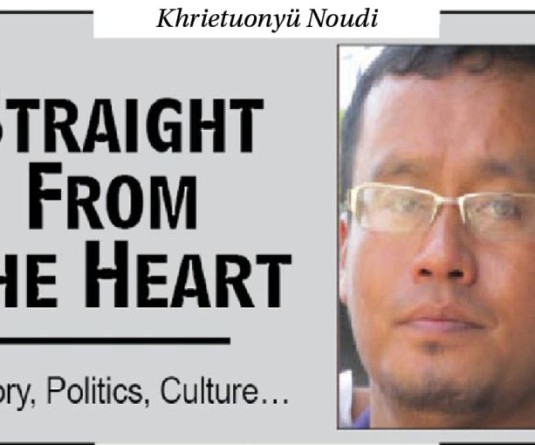
Paul N Rengma
Research Scholar, Dimapur
Nagaland is a Christian state and about 90% proudly identify as Christians. This suggests that we ought to be good, honest, holy, loving, peaceful, and above all children of God. We find great pleasure in alleviating and classifying ourselves as worshippers of the True Living God, King of Kings, and Lord of Lords. One might imagine oneself singing and dancing amid thousands of angels, exclaiming Hallelujah and singing Holy, Holy. Every Sunday, churches are packed with beautiful and heavenly people, singing praises and offering prayers to God. Life is full of bliss and divine. To them, the world may appear nonsense, meaningless, fragile, insignificant and temporary.
Karl Marx opines, “Religion is the opium of the people.” Amidst political blunders, suffering, and oppression, religion functions as a social tool, providing comfort, peace, and hope beyond this suffering world. Thus, hallucinating and silencing the oppressed community to remain mute spectators while the rich and the powerful enjoy all the privileges. It distracts people from addressing the root cause of their suffering and, the social and economic conditions of the state. The ruling power often relies on religion as their tool to garner the crowd. They shift their focus on religion, deviating people from challenging the real political and economic structures.
Nagaland is generally perceived as a failed state. The government fails to provide sufficient basic public services such as infrastructure, health care, education, and social welfare. Nagaland is a small state with less than three million people. However, it tops the chart in terms of the unemployment rate. The road condition is deplorable and poorly maintained. A road without potholes is not a Naga thing. Sanitation and hygiene in towns and cities lack concrete measures. Therefore, citizens are losing faith in the state’s ability to govern. Young minds are restless and distressed as they find themselves lacking basic needs. Rich kids venture out to the developed world chasing comfort and advancement. The poor remained jobless and complied with blue-collar jobs for their survival.
Despite the huge and sumptuous sanctions of money from the central government, we always end in deficit. In other words, Nagaland is a deficit state. We still fail to utilize the resources judiciously. Corruption and greed lead to diverting public funds. In Nagaland, ministers, bureaucrats, and government officials are like demigods. They have the absolute power to corrupt. Lord Acton says, “Absolute power corrupts absolutely.” This occurs when leaders hold too much-unchecked power and authority. Even great leaders or good men may be tempted to misuse power if not vigilant. The more power one holds, the more likely to abuse it.
Political honesty is adherence to truth, integrity, and ethical conduct in the political sphere. It is acting in transparency, accountability, and fairness. According to John Locke, individuals consent to form a government, to protect their rights to life, liberty, and property. If the government fails to keep public demands, the public has every right to revolt and change the government. Honesty in governance is important because any deficit violates the consent. Rule of Law is a key principle of political honesty and must apply to all including those in power. Niccolo Machiavelli believes, that “the ends justify the means.” Political leaders need to act with honesty to maintain their status and power. John Rawls emphasizes fairness and transparency in the political process. Hence, political honesty is a fair distribution of rights and resources in a society.
Aristotle says, “Man is a political animal.” Humans are inherently political and social beings. One cannot live isolated and achieve full potential. Every individual as part of the society is involved in public life and governance. They engage in discussions and decision-making and establish new rules. He stresses that any individual who does not participate in political life is unable to live as a full human being. We need order, justice and shared responsibility in society. These qualities make us different from other animals. Therefore every individual is part of society and is responsible for moral development and realise one’s full potential as a person. We must strive to promote the common good and ensure a eudaimonian state. Political leaders must be honest, and truthful, and must embody those virtues. They must encourage trust and unity within the state.
Richard Niebuhr emphasizes, “Our faithfulness to the trust placed in us by others and by God is the measure of our morality.” Individuals from the highest to the lowest are morally bound to be faithful, truthful and transparent. One must always strive for honesty despite limitations and resist the temptation for selfish gains. In this way, Nagas can bring massive development and changes to our people, land, and resources. Luke 16:10 says “Whoever can be trusted with very little can also be trusted with much, and whoever is dishonest with very little will also be dishonest with much. John 14:6 says, “I am the way and the truth and the life.” As Christians, do we have the audacity to declare the same as Jesus?




